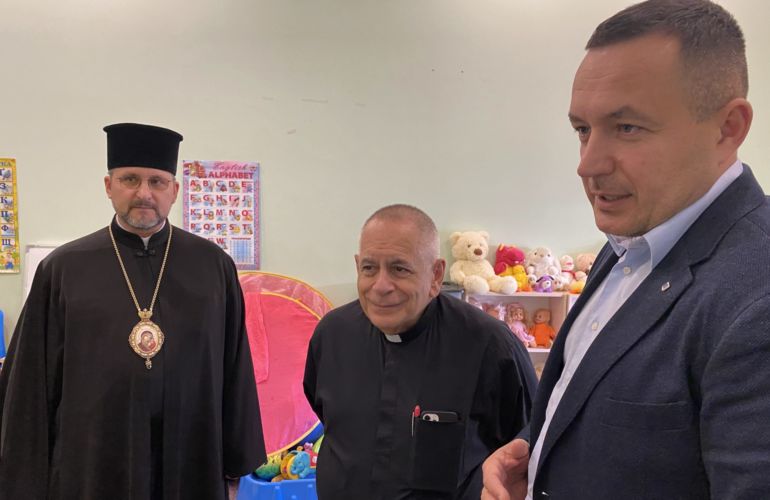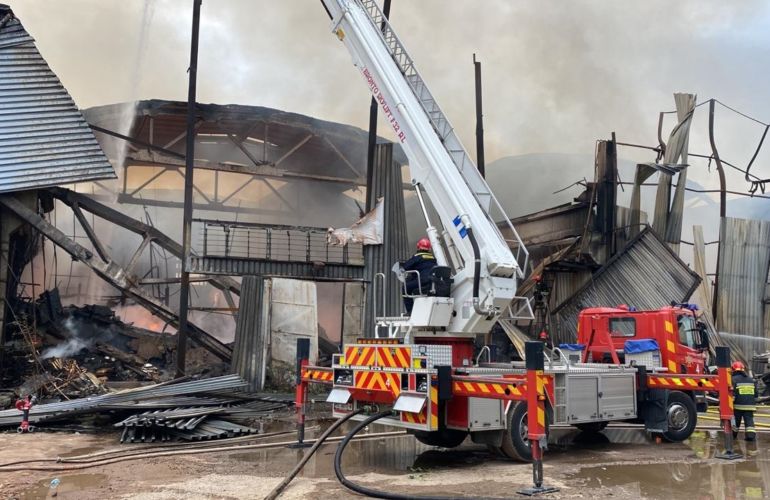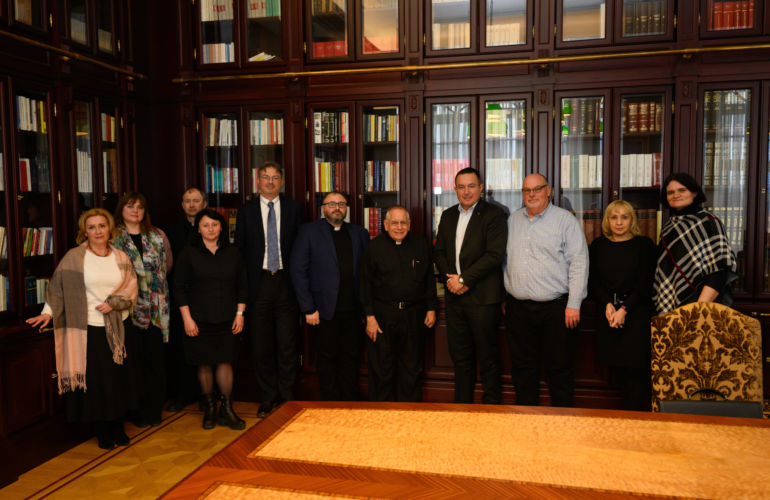ICMC Continues to Support Church Action for Displaced Persons in Ukraine
As the world marks three years since the full-scale Russian invasion of Ukraine, ICMC supports Church responses for displaced persons.

24 February 2025 marked three years since the full-scale Russian invasion of Ukraine, with the conflict showing little sign of abating despite international efforts to move toward a ceasefire.
While official estimates indicate approximately 13,000 civilian deaths caused by the conflict to date, with a further 31,000 civilians injured, actual numbers are likely to be far higher. The country’s economy, infrastructure, and social assistance systems have been devastated, and unemployment is widespread. The World Bank estimates the direct cost of this destruction as USD 176 billion, and the costs of recovery and reconstruction over the next decade at almost USD 524 billion.

The conflict continues to cause a profound displacement crisis, both within Ukraine and beyond. In March 2025, just under 7 million Ukrainians were living as refugees outside of their country, the vast majority of whom (6.4 million persons) were residing in Europe. A further 3.7 million persons were internally displaced within Ukraine, having fled the invasion to seek safety in other parts of the country.
‘The Church Accompanying the People’: ICMC Support for Ukraine to Date
Since the full-scale conflict began in 2022, ICMC has played a central role in ensuring a rapid and comprehensive Church response to the needs and situations of displaced persons, both within and outside of Ukraine.
During 2022-24, former ICMC Secretary General Monsignor Robert J. Vitillo conducted four solidarity visits to Ukraine with an ICMC delegation, meeting with internally displaced and those directly affected by the destruction and loss, as well as Church leaders, priests, religious, and lay people serving those in need. “During a wartime situation, many organizations respond to the immediate needs of the people: food, clothing, shelter, and providing a place that they can stay in a secure situation during the emergency”, he said. “I think the Church brings a very different perspective: it’s usually there already, and it will stay during the crisis whether or not there are outside budgets or financing. And the Church will be there afterwards: it’s about accompanying the people, rather than simply responding to certain emergencies.”
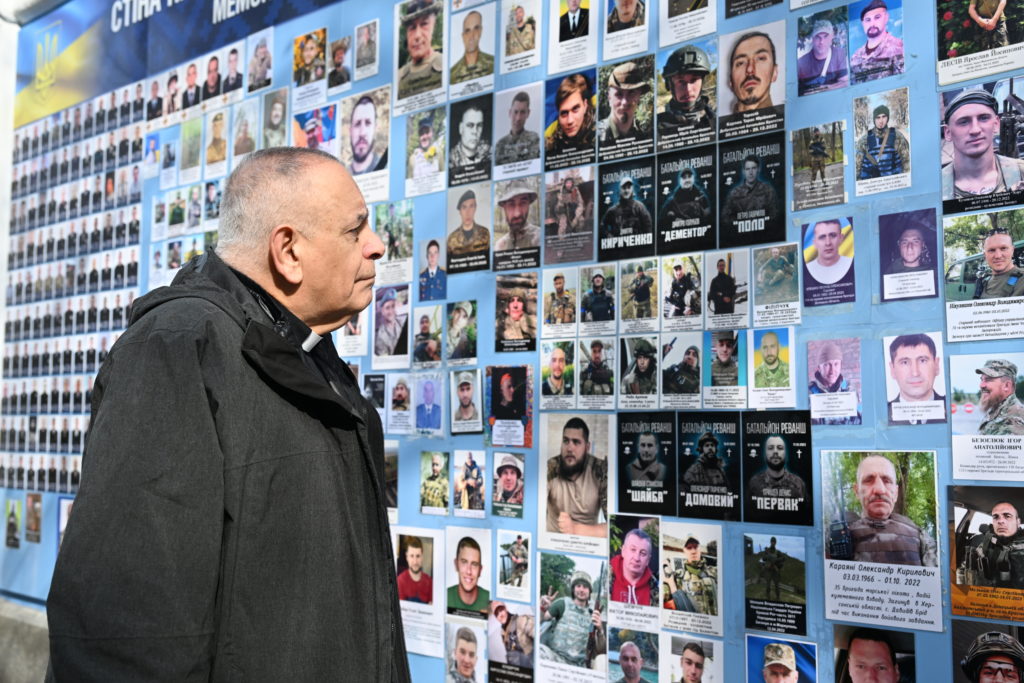
ICMC was a founding member of the Catholic Response for Ukraine Working Group (CR4U), a partnership of major Catholic organizations established in March 2022, and acts as the group’s convenor at the request of other members. CR4U provides a framework to coordinate existing efforts of Catholic organizations in Ukraine and neighboring countries, identify new actions, and plan how the group’s members can most effectively implement them. Within Ukraine, CR4U provides a framework for its members to engage the Church in projects aimed at strengthening its pastoral and social ministry, while CR4U members directly finance Church projects.
ICMC has also directly supported action focused on addressing the mental health needs of those affected by the conflict in Ukraine, prioritizing working through Church networks to support a diverse range of Catholic organizations to provide psychological assistance.
“ICMC decided to give some emergency aid, but also focus much more on the mental health and trauma treatment needs of the people here,” explained Msgr. Vitillo during the second ICMC solidarity visit in March 2023. “We’ve been supporting the organizations of the Church in Ukraine that could provide that expertise, but needed resources to pay the salaries of the professionals so they also could provide for their families. That’s really been at the core of our approach in responding to this situation as ICMC.”
Initiatives supported by ICMC in this context include a play-based therapeutic intervention program to address mental health and recovery amongst children impacted by the conflict, implemented by the Greek Catholic Archcathedral of the Immaculate Conception, in the western Ukrainian city of Ternopil, and a series of residential psychological rehabilitation workshops for 15 Ukrainian veterans and their spouses, implemented in partnership with the Knights of Columbus.
In 2025, as the conflict persists, ICMC is continuing to target its support at actions for mental health and psychosocial assistance, including – amongst others – the Chortkiv House of Mercy in western Ukraine, and specialized training on pastoral counseling for Catholic seminarians.
Caring for the Most Vulnerable: Chortkiv House of Mercy
The House of Mercy in Chortkiv was founded in 2013 by the Eparchy of Buchach, as a diocesan outpatient rehabilitation facility for children with disabilities. It later expanded its activities to include residential programs with outpatient services, and during 2014-19 provided physical and psychosocial rehabilitation services to around 500 children with physical and/or developmental disabilities.
At the beginning of the full-scale invasion in early 2022, the House of Mercy opened its doors to internally displaced adults and children, including unaccompanied children who had been abandoned by their parents who were unable or unwilling to care for them.
“In the first days of the war, we were able to evacuate our children to Italy and Poland with the help of some foundations”, explains Tetiana Dubyna, Director of the House of Mercy. “In their place, we were able to take in internally displaced people from virtually all corners of Ukraine. The biggest difficulties were for adults with disabilities: no one wanted to accept them, and there were no specialized facilities where they could go.”
Three years of war has only increased the number of displaced adults and children who require psychological support and/or rehabilitation. Today, the House of Mercy accommodates 150 internally displaced residents, including 30 adults with disabilities, five single mothers with 25 children who have disabilities, and 90 unaccompanied children with disabilities, and provides a further 15 children from the local community with daily outpatient care.
In 2025, ICMC will fund the salaries of seven psychologists and three social workers currently employed at the House of Mercy, providing the expertise needed to continue crucial assistance for children with physical and developmental disabilities, and support for parents and carers.
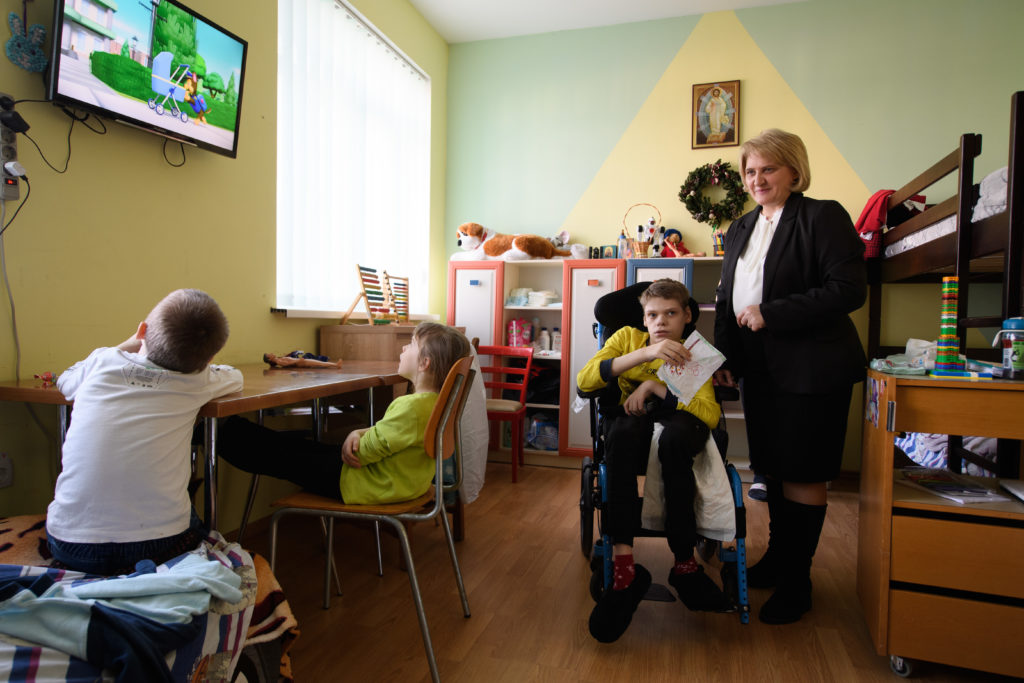
“The displacement caused by the war heightens the difficulty and urgency of providing these children with the early childhood rehabilitation necessary to support their lifelong wellbeing”, says Dubyna. “We are grateful that ICMC’s support will enable the diocese to continue providing crucial psychosocial support services, including individual and group therapy, play therapy, and individual training sessions with parents/caretakers. These services will aid the early detection and correction of developmental issues, help develop positive interpersonal skills and patterns in children with physical and psychosocial disabilities, and develop the psychological competencies of parents and caregivers.”
Building Psychosocial Capacity Within the Church: Training for Seminarians
Exposure to the war in Ukraine has led to vastly increased levels of depression, anxiety, and post-traumatic stress amongst affected populations, in addition to trauma and grief for those suffering conflict bereavements. From the outset of the war, clergy in Ukraine have seen an increased demand for counseling from those with complex, war-related trauma issues. This situation presented a clear and ongoing need for training, to equip clergy to properly recognize the symptoms of psychological disorders and effectively collaborate with trained mental health professionals. From November 2022, ICMC partnered with the Ukrainian Greek-Catholic Seminary of the Holy Spirit in Lviv, to host a series of workshops on providing spiritual and psychological assistance for Greek Catholic and Roman Catholic seminaries in nine locations around Ukraine. This work continued in 2023-24, with 1,360 individual psychological support sessions for seminarians, conducted in collaboration with the Mental Health Hub DiyaTy.

Speaking in February 2023, one of the program’s trainers Dr. Maria Trakalo, outlined the core elements of the training. “The training focuses on seminarians because they are preparing for future ministry. We talk about the psychological manifestations of trauma during war, and about the need to take care of oneself in order to be able to help others. We also explore the notion of psychological trauma and its signs and symptoms, including how to recognize trauma in oneself and others, and the tools we need so we are prepared to assist.”
Highlighting the importance of including a spiritual element in the treatment of war-related trauma, Dr. Trakalo emphasized the training program’s emphasis on a cooperative treatment approach. “We explain that humans consist of spirit, soul, and body, that psychological trauma has a harmful impact on all three, and that we need to treat people holistically”, she explained. “I emphasize that we must learn to provide care as a team, because we need a priest, a psychotherapist, and a psychiatrist or other healthcare professionals. It won’t suffice to only treat wounds: it is also necessary to help people overcome post-traumatic stress disorder and rediscover their sense of purpose, to give them the impetus to live on.”
The training program highlighted how many seminarians themselves need support to manage their own trauma and psychosocial needs. In 2025, ICMC is responding to this need by supporting the Lviv-based Student Chaplaincy Center of the Ukrainian Greek Catholic Church, to provide individualized counseling for seminarians. During January-April 2025, the program provided 40 seminarians with in-person individual counseling to promote their psychological resilience and mental health, at the DiyaTy Mental Health Hub in Lviv.

“With ICMC’s support, our program will provide 400 hours of individual psychotherapy for seminarians, alongside monthly supervision meetings at which psychologists, psychotherapists, and clergy can share experiences, jointly find solutions for difficult cases, and accompany seminarians”, says Dr. Trakalo.
ICMC support is additionally enabling a pilot supervised ministry training program, provided to students at the Lviv Greek Catholic Seminary of the Holy Spirit. Starting in December 2024 and continuing until the end of 2025, the program provides opportunities for seminarians in the last two years of their training program to meet with and accompany people who are grieving loved ones lost in the conflict. The training takes place at local cemeteries, under the supervision of priests and psychologists.
“In the longer term, our training means that the communities the seminarians serve in the future will receive not only spiritual but also psychological support, which is especially important for people affected by war”, explains Dr. Trakalo. “This will in turn strengthen community trust in the Church as an institution performing an important social mission, and help to create stable communities capable of overcoming the challenges of the post-war period.”

Rachel Westerby
Independent writer and researcher on migration and refugees.
